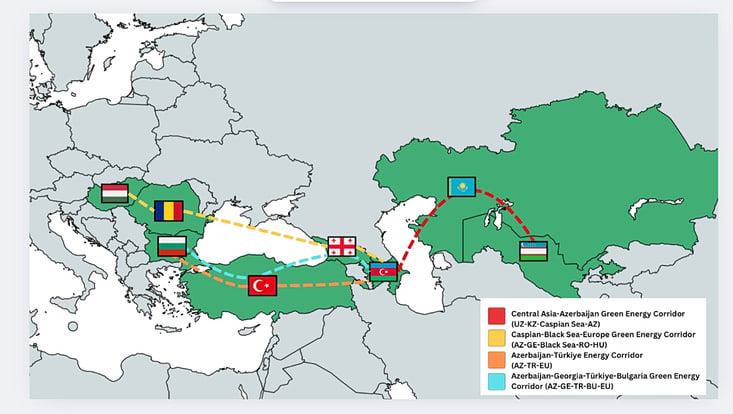Student research project - The Green Energy Corridors between the Black and the Caspian Sea: Enhancing Energy Security and Sustainable Development in the EU, Caucasus, and Central AsiaBy Abbasov Tural with Jamila Aliyeva
27. Mai 2025

Foto: Illustrated by Abbasov Tural
This student research project was successful in acquiring funding from the Excellence Strategy. More information can be found here.
As the European Union accelerates its transition to renewable energy, our research project at the University of Hamburg is set to explore the emerging role of green energy corridors linking the EU with the Caucasus and Central Asia. Titled “The Green Energy Corridors between the Black and the Caspian Sea: Enhancing Energy Security and Sustainable Development in the EU, Caucasus, and Central Asia,” the study aims to explore how renewable energy cooperation across these regions can strengthen energy security, reduce reliance on fossil fuels, and promote sustainable development.
Driven by geopolitical shifts and climate imperatives, these transnational corridors—including the Black Sea Submarine Cable and the Central Asia-Azerbaijan route—are designed to transport renewable electricity to European markets. The research examines their potential to support the EU’s climate neutrality goals while offering economic and strategic benefits to energy-producing countries such as Azerbaijan, Georgia, Kazakhstan, and others.
The project combines policy analysis, infrastructure assessment, and case studies, engaging stakeholders from academia, international organizations, and the energy sector. It underscores the contribution of these corridors to global Sustainable Development Goals, particularly clean energy access, innovation, climate action, and partnerships.
We hope that this timely study will add to the growing academic discourse on cross-border energy cooperation, presenting the green corridors as a blueprint for resilient and inclusive energy futures.
